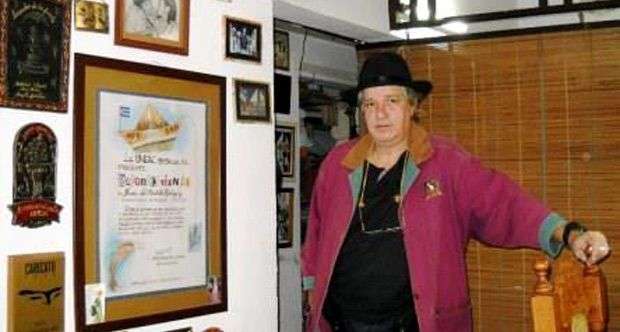Playwright and television director Jesus Castillo says that when he came across by chance with the official announcement of the international contest Ocean State Poets , based in Providence, USA and sponsored by some libraries in Rhode Island, there were only ten days left before the closing date for admission.
Stubborn as he is, this Electrical Engineer turned into playwright, theater director, screenwriter for television and radio, was undaunted and wrote the play National Sport where he exorcises several demons that had haunted him since childhood. It was a play that he had the urge to write.
“It is based on the social phenomenon produced by Victor Mesa and Matanzas players during the penultimate National Series where my province won third place,” he said by way of introduction.
National Sports is a work of fiction with autobiographical elements which reflects part of life of the author of more than thirty works of theater for children and adults, over 400 scripts for the television program Barquito de Papel and a dozen stories.
“For me it is one of the most beautiful pieces I’ve written for the Cuban theater. It contains factual testimony of my reality.
“As a child I was a baseball player. My father taught me to play ball. I joined the baseball team officially known as Cubanito. It is so called because it was from toddlers to teens that were thirteen “the winner of the Casa de las Americas Prize in 1998 for his children’s work Pipepa tells us.
“When I was 16 my dad left Cuba, died in the United States and I never saw him again. From that moment began my rejection of the ball because I remember the times we had spent together. “
Not by chance Orestes, the protagonist of National Sport, is a Cuban who does not like the baseball and is a football fan.
“Every time the Real Madrid team played the man of my work was meeting with his son Diego, named in honor of Diego Armando Maradona and some other friends to watch football games on TV. It was like a ritual, “he explains.
In this mix of fiction and reality Del Castillo recreated an event that divided Matanzas fans.
“One day, coincidentally, at the Victoria de Giron stadium Matanzas team was playing against Industriales. Meanwhile, in Spain, Real Madrid was against Barcelona.
“In the middle of the game, at Orestes house arrives a half brother of his who called himself Victor-like the Cuban baseball player, of which he was unaware because he had been born in the United States.
“He was an older man, with knowledge of the art of baseball. Victor came with the mission of telling the protagonist why his father had left Cuba “.
As you go through the reading of the work you are given five different versions of the facts, at the end he reveals the real reasons for this father to leave his young son.
With this piece Del Castillo advocates for family reunion and forgiveness. Someone like him, marked by the phenomenon of migration to the United States, needed to share his personal experiences. So, as a challenge he says:
“What is the national sport of the Cubans? Will it be about baseball or the families who left the country and which we have never seen again? “
From Providence to the Athens of Cuba
As Chuchi he had to send his work to the contest through a friend who would visit in those days the United States and he did not attend the competition and award process.
Miguel Ángel Odio (a Cuban American, contest director) and the Dominican painter Felix Dicló traveled to the headquarters of the Casa de las Américas in Varadero, Matanzas
“They decided to come to Cuba to give me the cash of the award. For the first time they summoned that contest and I, a Cuban, was the overall winner. It was a very emotional event.
“Thanks to them I also met the Dominican dramatist Francis Parra who wants to stage my work in Rhode Island.”
The piece contains elements of surprise, mystery, and police intrigue. It is marked by the presence of ghosts, – everything is in the field of speculation, perhaps as a metaphor for the ghosts that accompany us throughout our existence, these pieces of the past of which we have a hard time letting go, throw them out , delete.
At this time Jesus del Castillo gave the text to the Dramatized Programs Division of Cuban television with the desire to see it soon turned into a TV movie.
Several of his plays for children and adults have been taken to scene. Other works of his as Pipepa, The Last Raung, The Sparrow Cage and The Mask of Don Juan have been adapted, with critical and commercial success, as national television movies.
Del Castillo has won other international awards as the mention in the House Theatre Award contest (2005, Santo Domingo) and Second Prize in the VI Ibero-American Prize for Children and Youth Drama (2009 – Bilbao, Spain).
His television Barquito de Papel was awarded by the UNICEF office as the most popular children’s program in Cuba in 2006.
In 2010 he participated in the Bilbao International Festival of Puppet Theatre with the show Pueblito de Cuentos. His project was recognized by UNICEF in the Basque country for its dedication to children.










